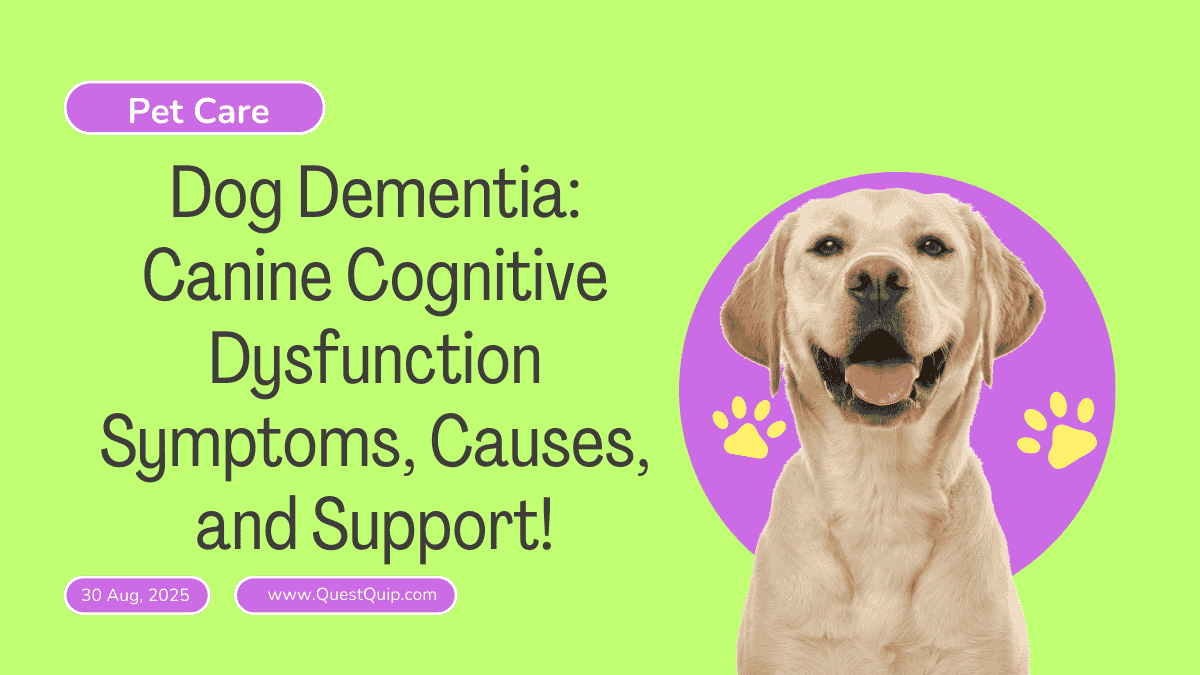Dog Dementia
What Is Dog Dementia (Canine Cognitive Dysfunction)?
Dog dementia, also known as canine cognitive dysfunction (CCD), is a condition similar to Alzheimer’s disease in humans, affecting senior dogs with age-related brain changes. This progressive syndrome leads to dog dementia symptoms such as confusion, forgetfulness, and anxiety. Affected dogs may struggle with memory, spatial awareness, and familiar routines, often showing worsening behaviors at night, a phenomenon called sundowning in dogs. While not a medical emergency, canine cognitive dysfunction requires dedicated care to support senior dog health and quality of life.
Symptoms of Dog Dementia
Identifying dog dementia signs early is key to effective management. Common symptoms of canine cognitive dysfunction include:
- Aimless wandering, particularly at night, disrupting dog sleep patterns.
- Getting stuck in corners or appearing lost in familiar environments.
- Excessive barking or howling without clear triggers.
- Increased anxiety in senior dogs, such as panting or appearing stressed without cause.
- Forgetting the location of food and water bowls.
- House soiling in dogs, including accidents indoors despite prior training.
- Changes in social interactions, such as avoiding family, irritability, clinginess, or separation anxiety in dogs.
- Forgetting learned commands or tricks, reflecting cognitive decline in dogs.
These signs indicate changes in canine brain health, necessitating veterinary attention.
Causes of Dog Dementia
Dog dementia causes are rooted in age-related brain deterioration. Primary factors include:
- Accumulation of beta-amyloid plaques, proteins that impair neuron communication, affecting memory, learning, and spatial awareness.
- Reduced blood flow to the brain, compromising canine cognitive health.
- Neuronal dysfunction, which hinders the brain’s ability to process information.
Senior dogs face the highest risk, with studies indicating 28% of dogs aged 11–12 and 68% of dogs aged 15–16 affected by canine cognitive dysfunction. Aging remains the primary driver, making senior dog care essential.
Diagnosing Dog Dementia
Diagnosing canine cognitive dysfunction involves evaluating dog behavior changes and ruling out other conditions with overlapping symptoms. Veterinary approaches include:
- Performing a physical exam, bloodwork, and X-rays to exclude conditions like liver disease (causing ammonia buildup), kidney disease, urinary infections, bladder stones, or arthritis, which can mimic dog dementia symptoms.
- Recommending CT scans in rare cases to detect brain tumors or abnormalities.
- Using tools like the CAnine DEmentia Scale (CADES) to assess cognitive impairment severity.
Pet parents should document changes, answering questions such as:
- Is my dog showing disorientation in dogs, like getting lost at home?
- Are there changes in social interactions, such as withdrawal or clinginess?
- Has the dog sleep-wake cycle shifted, with nighttime pacing?
- Is there increased house soiling or anxiety in dogs?
- Has their ability to perform familiar tasks declined?
Sharing these insights aids in confirming canine cognitive dysfunction.
Treating Dog Dementia
While dog dementia has no cure, treatments focus on managing symptoms and slowing progression. Effective strategies include:
- Environmental modifications: Install night lights to reduce nighttime confusion, use smaller, familiar spaces to minimize disorientation, or provide a comfortable crate for nighttime security.
- Nutritional supplements: Omega-3 fatty acids, vitamin E, apoaequorin, and coenzyme Q (in products like Vetality, Senilife, or Neutricks) may support canine brain health, though effectiveness varies.
- Specialized diets: Veterinary diets like Hills Cognitive + Mobility Brain Care j/d or Purina Neurocare, enriched with antioxidants and medium-chain triglycerides, promote senior dog cognitive health.
- Medications: Selegiline, an FDA-approved drug, may improve dog sleep-wake cycle issues, reduce house soiling, and enhance brain function.
These interventions aim to improve dog quality of life and manage canine cognitive decline.
Supporting Recovery and Long-Term Management
Although dog dementia is irreversible, consistent management can enhance symptoms and slow cognitive decline. Key practices include:
- Establishing a consistent routine to reduce confusion and anxiety in senior dogs.
- Promoting daily activity, such as 30-minute slow walks twice daily, to stimulate the brain and minimize nighttime restlessness.
- Combining environmental, nutritional, and medical strategies for comprehensive senior dog care.
- Setting realistic expectations, as behavior changes may persist, but dog quality of life can often be maintained with care and adaptability.
Regular veterinary checkups ensure effective canine cognitive dysfunction management.
Preventing Dog Dementia
While dog dementia cannot be fully prevented, early measures can delay its onset. Preventive steps include:
- Introducing nutritional supplements for brain health in middle-aged dogs.
- Feeding a senior dog diet rich in antioxidants to bolster canine cognitive health.
- Maintaining a regular schedule with daily exercise, such as walks, to support mental and physical health.
Proactive senior dog health care can extend cognitive vitality.
Frequently Asked Questions (FAQ) About Dog Dementia
What is the life expectancy of a dog with canine cognitive dysfunction?
As dog dementia typically affects senior dogs, life expectancy post-diagnosis is often a few years, depending on overall health and management.
What are the main dog dementia symptoms?
Key signs include nighttime pacing, disorientation, random vocalizing, house soiling in dogs, increased anxiety in senior dogs, and altered household interactions.
How does a dog with canine cognitive dysfunction behave?
Dogs may seem confused, forget routines (e.g., toileting outdoors), get stuck in corners, bark at nothing, or pace restlessly, especially at night, due to disrupted dog sleep patterns.
Can dogs recover from dog dementia?
Recovery is not possible, but canine cognitive dysfunction treatment can improve symptoms and slow progression, enhancing dog quality of life.
Why is dog dementia worse at night?
Sundowning in dogs results from disrupted dog sleep-wake cycles, as brain deterioration affects the internal clock, causing nighttime confusion and restlessness.
How can I support my dog with canine cognitive dysfunction?
Maintain a consistent routine, use environmental aids like night lights, offer brain-supporting diets or supplements, and consult your veterinarian for medications like selegiline to manage dog dementia symptoms.

